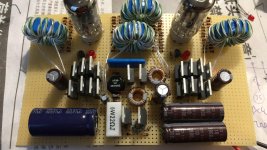Mathematics is a primitive system supporting primitive concepts, defined by primitive conventions, has a primitive language composed of primitive symbols and syntax rules and its operational limit is demarcated by primitive logic. The language of science is constructed from such miserably poor elements. Mathematics is the epitome of simplicity, generality, commonality, metaphysical determinism, idealism and absolutism. What is advanced is the mathematical topic.
N,
I went to Uni to get a math degree. I did well.
In the same way you say Math is primitive, it is cerainly based on very basic premise, one could say that a human is a construct of basic principals as well, but just like math, life is incrediably complex, and the magic is in the complexity.
Mathematics, unitil a little over a half-century ago, was stuck in the 5% of problems they could solve. But then the field of chaos theory, complexity theory, opened up the rest of the space for us to explore. We are still just starting to explore. But we are seeing the results, how much more accurate & fine grained weather prediction is today so much better then when i was a child. Expect it to get even better.
Math is beautiful and can generate incrediable complexity with very simple rules. Take the Mandelbrot set for instance.
dave
Dave,
we should not go deeper into this intricate subject. I am aware of the controversy surrounding such a statement. By the way, I am also aware of the high quality content of your posts.
we should not go deeper into this intricate subject. I am aware of the controversy surrounding such a statement. By the way, I am also aware of the high quality content of your posts.
Ears are always capable of delivering the finest impulses, while eyes sometimes seem forgotten or disadvanteged by the evolution of animals.
Schmitz77,
sense perception has been optimally determined by natural evolution, you can be sure of that.
Ot is unfortunate that we now live in a society where some of our sense capabilities are being subject to environments quite different than we evolved in.
This means that some are getting degraded, some enhanced.
Given the much greater amount of un-important noise (for our survival) has, i fear, in general degraded humans ability to [learn/have the brain programmed] hear.
dave
This means that some are getting degraded, some enhanced.
Given the much greater amount of un-important noise (for our survival) has, i fear, in general degraded humans ability to [learn/have the brain programmed] hear.
dave
planet10, on the subject of the 5% of problems that have closed form solutions: my brother, who is a very successful mechanical engineer, hated the extremely high mathematical content of his (Cambridge) degree. He is of the opinion that soon, physicists and engineers will no longer have to learn the old-fashioned ways of solving PDEs, etc. and will rely completely on computers. If true, I feel this would be a severe degradation of training to think/understand. What do you think?
This has been the case ever since man started developing technology.
While we may well loose some ability to start from scratch, having tools to help us magnify our abilities leads to new abilities.
We evolve, and there is no question that that evolution has changed the mix of skills we have.
Would you like to go back to a time when you actually had to calculate an orbit by hand?
I can remember pages and pages of evolving equations as i worked thru many problems.
dave
While we may well loose some ability to start from scratch, having tools to help us magnify our abilities leads to new abilities.
We evolve, and there is no question that that evolution has changed the mix of skills we have.
Would you like to go back to a time when you actually had to calculate an orbit by hand?
I can remember pages and pages of evolving equations as i worked thru many problems.
dave
Through my 10 years of auditioning many SE and PP amplifiers (BOTH pure class A), I've always founds strengths and weaknesses in both. I like listening to every kind of music, from "a girl with a guitar" to "three overdriven guitars playing simultaneously with double kick drum".
"Girl with a guitar" you can hear with almost all hifi systems. It never will sound real bad, maybe dull. Even distorted guitars and a kickdrum will sound nearly good on all systems. But a great, full orchestra symphony isn't audible on a tiny system. It will lack structure, energy of instruments, tone colors, dynamic bursts and the portrait of the stage in complete width between your speakers.
Thats the difference between grunge rock, singer/songwriter and complex music, performed with more than four people playing full force in an orchestra. I have records of those kind of music here, with them the wire jumps out of the cap. Full of energy which blows one away and let the neighbor joyn in immediately.
SE amps are easy to build - I've gotten great results with SEP - single-ended pentode - with local or loop feedback, with a single driver. Add in screen and/or front-end regulation, and, within its power limits, it has surprisingly good speaker control.
I'm not a biggest fan of single-ended triodes with zero feedback since it takes the right kind of speaker to make them work. The high output impedance usually means underdamped bass. And horn speakers, unless done right, can sound aggressive. There is a lot of money involved in getting something good in the speaker department, something I would prefer to bi or tri-amp.
In the world of SS I'm a big fan of the First Watt Aleph J amplifier - I made one via the fine folks here on DIY Audio - and it is sort of the best of both worlds of tube and solid-state. It has enough power for a lot of modern speakers and also has control of the bass.
Having said that, I'm currently listening to a push-pull 6AR6s (modified Eico ST-70) tube amplifier and I'm really liking it with a pair of KEF R500 speakers.
I'm not a biggest fan of single-ended triodes with zero feedback since it takes the right kind of speaker to make them work. The high output impedance usually means underdamped bass. And horn speakers, unless done right, can sound aggressive. There is a lot of money involved in getting something good in the speaker department, something I would prefer to bi or tri-amp.
In the world of SS I'm a big fan of the First Watt Aleph J amplifier - I made one via the fine folks here on DIY Audio - and it is sort of the best of both worlds of tube and solid-state. It has enough power for a lot of modern speakers and also has control of the bass.
Having said that, I'm currently listening to a push-pull 6AR6s (modified Eico ST-70) tube amplifier and I'm really liking it with a pair of KEF R500 speakers.
Try to get hold of this recording (or a file):
Maybe not everyones taste of music style but it is most revealing.
Very simple: If it hurts your ears then you have a long way to go, if it pleases your ears and everything is in harmony then you are on the right track.
Maybe not everyones taste of music style but it is most revealing.
Very simple: If it hurts your ears then you have a long way to go, if it pleases your ears and everything is in harmony then you are on the right track.
Attachments
Last edited:
Thats the difference between grunge rock, singer/songwriter and complex music
There is little question in my mind that classical music has dynamic scale & complexity across the bandwidth, others may “need” ability in the lower octaves, they do not have the complexity, and often none of the nuance.
Jazz has complexity & nuance but is rarely as dense.
Large presentations tend to come more from a whole space whereas smaller ones can provide a greater sense of image/space with small details standing out in the greater simplicity.
So, given all the compromises a speaker designer has to make, a system optimized for classical, or for jazz, or for rock, make design choices that make them less suitable for the others.
dave
I don't see why an amplifier or speaker shouldn't be able to reproduce what they are given. Do people have different sources for different musical genres?
Last edited:
That is exactly what they are doing ! Plus a little bit more (distortion, fase shift, frequency roll off, resonances, etc.).
Last edited:
Another record to consider for testing your set:
Wynton Marsalis & Eric Clapton - Ice cream -
Same here, if it hurts and you want to turn it off asap, you have a long way to go....
Wynton Marsalis & Eric Clapton - Ice cream -
Same here, if it hurts and you want to turn it off asap, you have a long way to go....
Yes, of course, the idea of different amps for different music implies an effects box and is a sales pitch.But an amp that handles the tough stuff should be able to handle the easy stuff, shouldn't it?
@Koruguy,
Not necessarily so. I have a TNT 200 amp that can handle "anything" you throw at it (2 Ohm load without a problem). But it lacks finesse and microdynamics.
This is a problem of the input circuit and the Mosfets used.
Not necessarily so. I have a TNT 200 amp that can handle "anything" you throw at it (2 Ohm load without a problem). But it lacks finesse and microdynamics.
This is a problem of the input circuit and the Mosfets used.
That was my thought. Different colors for different genres.Yes, of course, the idea of different amps for different music implies an effects box and is a sales pitch.
- Home
- Amplifiers
- Tubes / Valves
- Why has single ended output become popular

